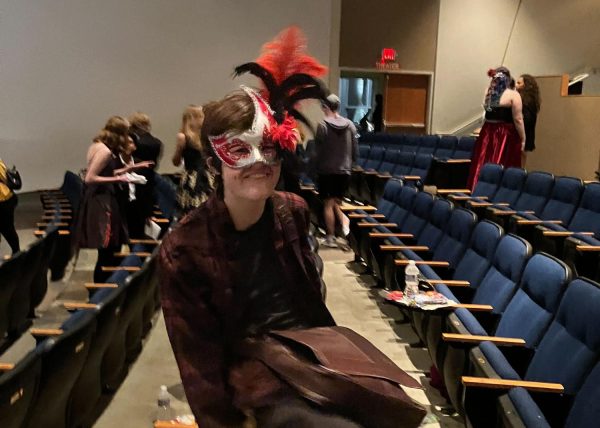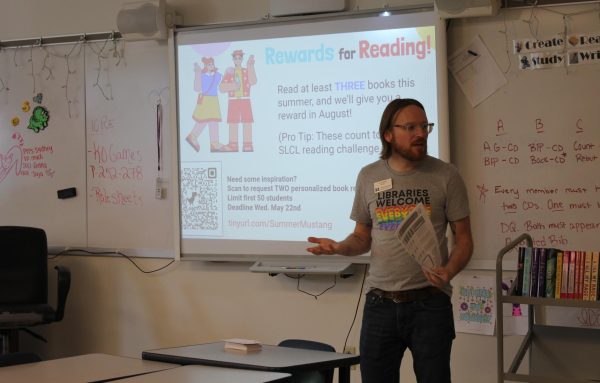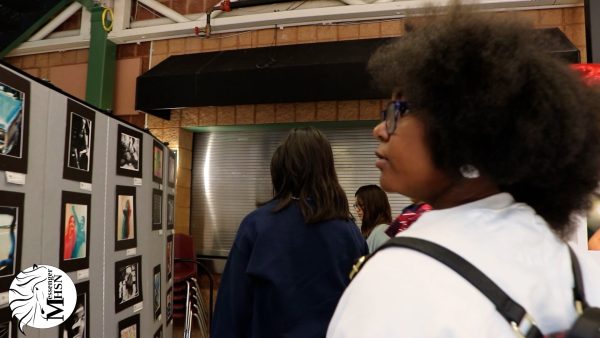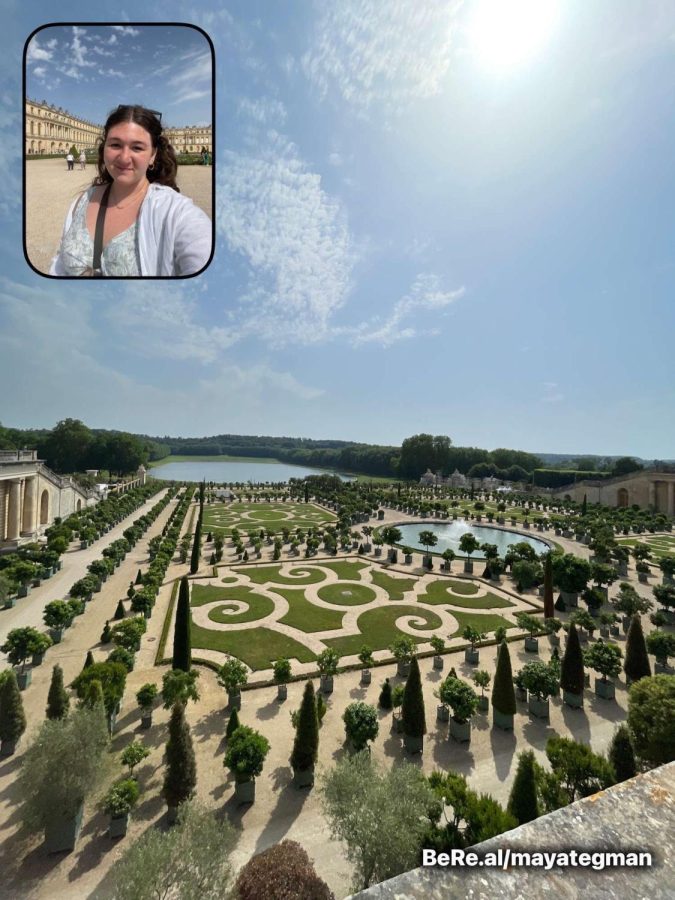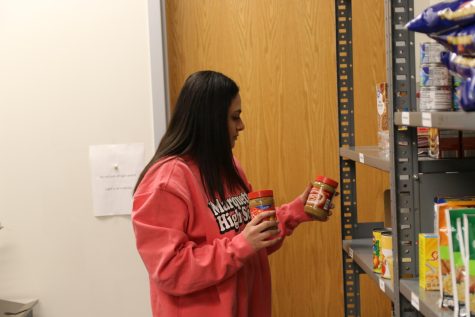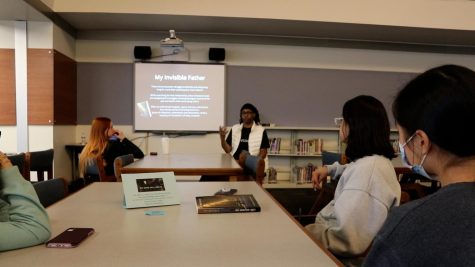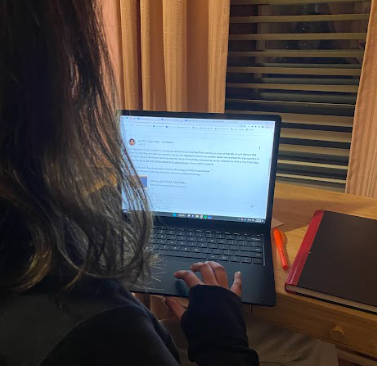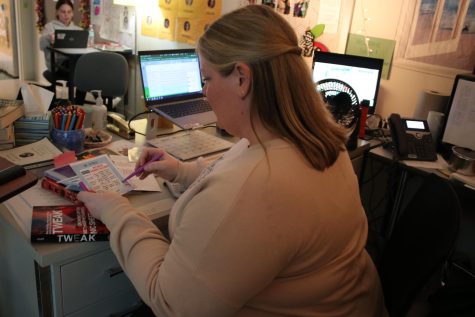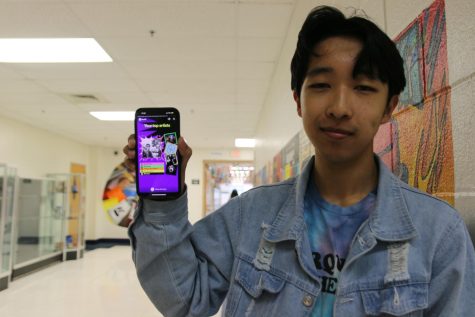Is it Authentic? People reflect on the authenticity of social media
Media by Maya Tegman
Maya Tegman, senior, and her cousin pose for a BeReal in front of the Trevy Fountain in Rome, Italy, on May 31. During the beginning of the summer, Tegman took a trip in Europe and used BeReal as a way to document her trip. “It’s a way to document my memories,” Tegman said.
When the much anticipated BeReal notification went off, many students posed in the classrooms and hallways of MHS. Meanwhile, Maya Tegman, senior, captured her BeReal in an unexpected location: the Trevi Fountain in Rome, Italy.
BeReal, a French social media app launched in 2020, aims to make filter-free and candid content by prompting users to take an unedited photo once a day at a random time selected by the app.
After downloading the app in May, Tegman spent about three and a half weeks in Europe where she took all her BeReals within two minutes of the alert.
“Taking a random, candid picture allowed me to stop, think and appreciate where I am,” Tegman said.
Tegman said her favorite aspect is the app’s greater authenticity than other social media.
“I love taking photos and these are so much different than normal, formal pictures,” Tegman said. “It’s one shot and one take and it’s that simple.”
Authenticity of BeReal
Tegman is not the only one who has been discussing the complexities of BeReal within the social media world. The app has garnered more than 21.6 million users in July of 2022, a substantial increase from only 921,000 users in July 2021, according to Business of Apps.
While the app strives to achieve authenticity, Christina Tyulyayev, senior, doesn’t have the app and does not plan on getting it as she said BeReal fails to achieve this goal.
Taking a random, candid picture allowed me to stop, think and appreciate where I am,
— Maya Tegman
“At the beginning, it was somewhat authentic but as it’s become more popular, I don’t think that’s true anymore,” Tyulyayev said. “Most people get ready for the picture and pose for it which ruins the whole purpose.”
Tyulyayev said the format and message of BeReal is admirable, but authenticity in social media cannot be reached.
“No social media is authentic,” Tyulyayev said. “With all the filters, edits, opinions and pressure, it’s hard for people to show the real them.”
Evelyn Hubmeier, sophomore, said BeReal forces its users to be authentic with the app’s transparency in the number of retakes and screenshots.
“Obviously social media is very filtered, but BeReal gives the opportunity to actually show our real life and the small parts that happen,” Hubmeier said.
Carter Gleason, senior, said his favorite aspect of the app is the uniqueness in marketing.
“There’s no advertising, there’s no sponsorship, there’s no for you page or anything like that. You just get to see what your friends are doing,” Gleason said.
Gleason downloaded the app during the summer after being inspired by his friends. In order to be authentic, Gleason posts on time with a few exceptions as he aims to be authentic.
“It’s a constant that happens every day,” Gleason said. “I just think it’s cool that everyone posts at the same exact time and is united in one space.”
While Gleason usually posts on time, Claire Montgomery, senior, waits to post if she has an event later in the day.
“It’s a non-judgemental area, so if I’m going to a cool concert or sporting event then I’ll try to wait even though you’re not supposed to,” Montgomery said.
Social Media Authenticity
Ed Bolton, science teacher, started on social media when he was in college with Facebook. Since then, he has had an Instagram and Twitter account at various times.
I see people wanting a manufactured reality because it makes them in one way shape or form comfortable.
— Ed Bolton
As someone who has witnessed the growth in social media’s popularity, Bolton said he has seen it lessen in authenticity.
“I think when it becomes massive, it is harder to be authentic,” Bolton said.
The curation of what people see on social media is what Bolton said makes it inauthentic. Bolton has noticed that companies create algorithms that assemble content curated to the user’s preferences, based on previous activity on other posts.
“I think it gives you an illusion of your own world,” Bolton said.
Having social media become authentic is based on the people posting, Bolton said.
“I think people need to have the desire to be authentic, and I don’t see that,” Bolton said. “I see people wanting a manufactured reality because it makes them in one way shape or form comfortable.”
Last year, Emily Chien, sophomore, created a spam Instagram account that has played a big part in her trying to be authentic. “Spam” accounts are accounts that allow users to post unique content, mostly intended for close friends. She created her account to share her authentic moments with her friends.
“I like setting a standard just to show all the moments in my life,” Chien said.
Although she makes an effort to be authentic, Chien said social media can’t truly be authentic because social media shows only people’s best selves.
Chien encourages others to create spam accounts to post the little moments in their lives.
Psychology in Social Media
Although the premise of BeReal is interesting, Ashley Hobbs, psychology teacher, said that the fact that someone can retake a photo or post late is not letting BeReal achieve its purpose.
More than BeReal, social media can affect teenagers’ mental health due to the nature of what people post, Hobbs said.
“The majority of people post their highlights — the best things that happened to them in their life — their favorite pictures, and it provides this false sense of reality to others,” Hobbs said.
This is a psychological phenomenon called The Facebook Effect where teenagers just see other people’s highlights, and start to compare themselves to the best-perceived parts of others’ lives.
Seeing the best of others can lead to anxiety, depression and lower feelings of self-worth, Hobbs said.
“I think that definitely it can impact our self-esteem,” Hobbs said. “I’m not saying that what people post isn’t authentic; it’s just not the whole picture.”
Your donation will support the student journalists of Marquette High School. Your contribution will allow us to purchase equipment and cover our annual website hosting costs. You may become a PATRON by making a donation at one of these levels: White/$30, Green/$50, Blue/$100. Patron names will be published in the print newsmagazine, on the website and once per quarter on our social media accounts.

Aarushi Bute, senior, is the Editor-in-Chief of the Marquette Messenger. She is passionate about public health, politics, and writing, particularly to...
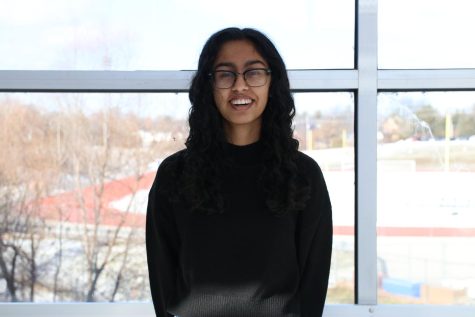
Anika Talyan, senior, is the Copy Editor for the Marquette Messenger. This is her fourth year on staff. At MHS she is involved in Robotics and RSD Lives....



